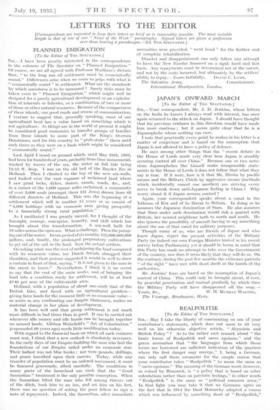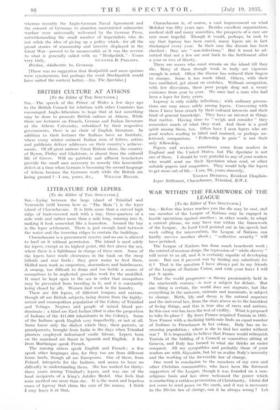REALPOLITIK
[To the Editor of THE SPECTATOR.] Sta,—May I take the liberty of commenting on one of your ',contributor's statements, which does not seem to sit very well on his otherwise objective article, Abyssinia and British Policy " ? As to the rather curt remark about "the brute forces of Realpolitik and sacro egoismo," and the grave accusation that "the languages from which those terms are borrowed are sufficient indication of the quarter where the first danger may emerge," I, being a German, can • only call them 'erroneous for the simple reason that your contributor takes " Realpolitik "• to mean the same as " saero egoisrno." The meaning of the German word, however, 'as coined by Bismarck, is "a policy that is based on sober calculations rather than on patriotic feelings," in other words " Realpolitik " is the same as " political common sense." In that light you may take it that we Germans agree on -the fact that in 1914 -the Dual Monarchy adopted a course which was influenced by something short of "
whereas recently the Anglo-German Naval Agreement and the consent of Germany to abandon unrestricted submarine warfare were universally welcomed by the German Press, notwithstanding the small number of imperialists who do not relish the idea of giving up a policy which—for all the proud stories of seamanship and bravery displayed in the Great War—proved to be unsuccessful, as it was the reverse to what is generally called with us " Realpolitik."—Yours very truly, GUENTER 13, PHILIPPS. Breslau, Adalbertstr. 10. Germany.
' "[There was no suggestion that Realpolitik and sacro egoism° were synonymous, but perhaps the word Machtpolitik would have suited the context better.—En. The Spectator.]



























































 Previous page
Previous page